Put down the knife and fork – this isn’t something you want to read over lunch.
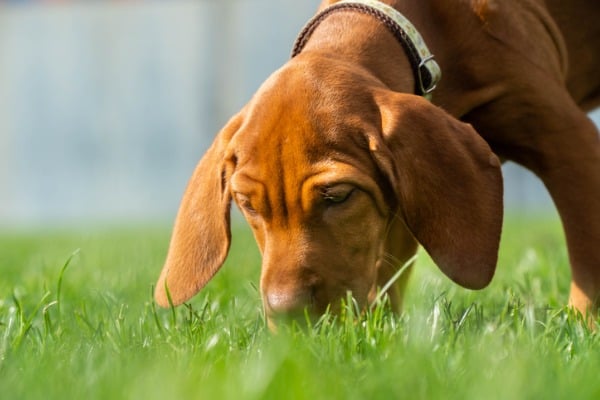
Many pet parents know that some gross mishaps and habits come as part of the package when your child is of the four-legged variety.
They puke, they lick their butts, they scoot on your carpets, can drink their own urine…
Sometimes they like to snack on poop too.
Dogs with this weird habit aren’t prejudiced when it comes to dining on poo.
They like their own, that of smaller pets, livestock, and perhaps their favorite – cat poop.
It can be disgusting.
It’s less than desirable behavior, especially when your dog also likes to show affection with lots of licking.
A dog who has a poop-eating habit is also unbearable to be around if they pant in your face.
How can you break a dog from this nasty habit?
There are some things you can do to curb their behavior, and no – you don’t need to call in a dog trainer.
In this article, we’ll even go over how to stop a dog from eating cat poop using a home remedy, as well as other preventive measures you can take.
Understanding Dogs and Poop
Why do dogs eat poop?
Answering this question can help in solving it.
Their choice of poop can also provide some clues as to why they seem to enjoy eating it – whether they try to eat their own or treat the cat’s litter box as an open buffet.
There’s even a scientific term for this behavior – coprophagia.
Why Do Dogs Eat Cat Poop?
Have you ever noticed your dog seems attracted to the cat’s food?
The smells and flavors in cat food – both dry and wet varieties – can be as enticing to your dog as it is to your cat.
Although cat food and what you scoop out of the litter box are two entirely different things to you, your dog is probably reminded of cat food when they encounter cat poop.
They might also be curious.
Dogs and puppies especially sometimes investigate things by putting them in their mouths.
Why Do Dogs Eat Their Own Poop?
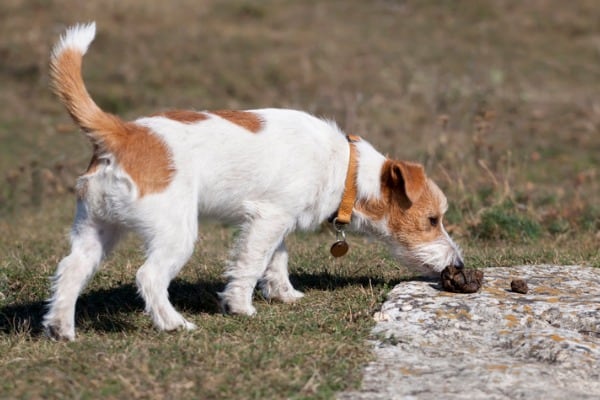
The answer to this question is a little more complicated.
Malnourished dogs with coprophagia eat their poop because they’re trying to get some essential nutrients.
A rescue who was neglected, for example, could pick up and hold onto this habit well after they’re in a loving home.
Any dog who has had their nose rubbed in an accident has a higher risk of developing a poop-eating habit.
Why does that cause such a gross habit?
One theory is that a dog, who can’t understand punishment the way humans do, interprets the action as their owner wanting them to eat the poop.
There’s another theory.
Dogs who have been mishandled, mistreated, and have had their noses rubbed in poop as punishment will eat any poop to “destroy the evidence.”
They think they’re in trouble because they relieved themselves.
So don’t do it:
Rubbing a dog’s nose in their poo isn’t something we recommend, even if they have an accident on your prized oriental rug.
You might be dealing with a rescued dog who has been subjected to this borderline abusive behavior, even if you’ve never done it to them.
The same goes for a previously malnourished dog.
It can take some time to break the habit of eating poop, even if they’re on a balanced diet now.
Your dog doesn’t have to be rail-thin to be malnourished, either.
They can have some deficiencies and shortcomings in their diet because of parasites, lack of sufficient calories, or malabsorption issues.
Why Do Dogs Eat Other Animals Poop?
Have you ever been for a nice hike with your dog, only for it to be ruined by your dog lunching on the poo of an unknown animal?
Or, perhaps taking your dog to visit a farm ended in them mistaking a manure pile for fine dining.
What compels a dog to eat the poop of other animals – particularly herbivores?
For one, the smell is probably interesting to them. They don’t necessarily see a cow pie as we do.
They see a pile of digested vegetation that warrants inspecting – and a taste test.
Poop is about perception to a dog
Dogs are known to eat grass and other plants for a variety of reasons.
To them, the poop of a horse, cow, goat, or even wild animals like deer, elk, and moose are just fancy versions of grass and roughage.
There can sometimes be an underlying fiber deficiency that drives a dog to eat herbivore poop.
Usually, it’s just the curiosity factor that triggers the behavior.
Once they’ve had a taste of farm animal poop, dogs might decide they like the taste and texture – and thus, it becomes a coveted, if unacceptable, snack.
Scavenging behavior can also compel your dog to eat the poop of farm and wild animals. They could be eating it for the same reasons they raid trash.
Carnivore poop can contain traces of things like fur, feathers, and bones.
These things are extra alluring to dogs and can entice them into giving it a taste.
This can also cause them to eat other dogs’ poop, as well.
How to Prevent Your Dog from Eating Poop
A dog eating poop remedy can be about prevention, behavior modification, or even diet adjustment.
Now that you know a little more about why dogs eat poop, you can have a better strategy to get them to stop.
We’ll go over some useful dog eating poop remedies that you can work on at home.
No More Litter Box Transactions
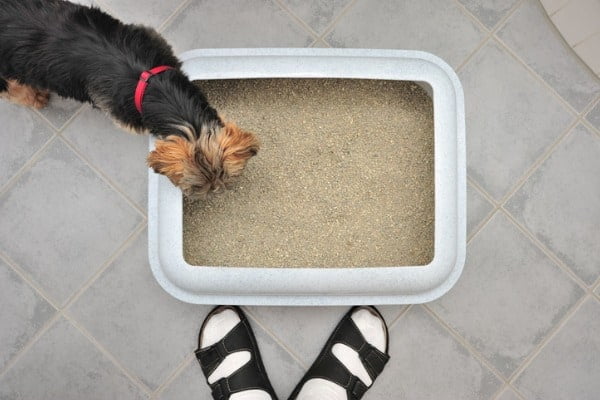
Part of the reason your dog eats the cat poop is that they like it, but a big part of the reason is because they can.
Your dog uses the litter pan like an hors d’oeuvre tray because they have access to it.
The easiest and simplest way to stop this behavior is to block access to the litter box.
Enclosed boxes aren’t always enough to discourage dogs from going for the cat poop.
They often need a baby gate or an actual door to keep them out.
Most cats can easily jump the gate to get to their litter pan.
If you can’t block off the room where the litter box is, you can try putting up the barrier somewhere else.
For example, if your cat’s box is upstairs, block off the staircase. T
his will give the cat plenty of freedom while still keeping your dog far away from the box.
Teach the “Leave It!” Command
This can be helpful for deterring your dog from grazing the litter box as well as eating their own poop or that of random animals.
It works:
It’s also a smart command to teach your dog in case they ever pick up something worse than poop – like sharp objects or toxic substances.
The video below shows an easy way to train this command.
Establish a reliable “leave it” command with your dog, and use the command any time you catch them trying to eat poop.
This method will work well when you can’t control the environment – or monitor all of the temptations in the vicinity.
Sometimes stray cats wander into yards and use it as a toilet.
It can be harder to clear up cat poop since it’s smaller, and harder to spot, and you don’t always see where the cat left a present in the garden.
“Leave it” requires you to watch your dog any time they’re near a litter box or outside, so you know when to give the command.
Try this:
In the early phases of training, keeping your dog leashed will have a better outcome.
If your dog doesn’t listen to the command, pull them away and walk quickly in the opposite direction.
It’s a good idea to keep your dog leashed on walks or hikes until they can be trusted not to zero in on poop.
Waste left behind by irresponsible dog owners or wildlife can be just as enticing to your dog.
Redirect and Reward
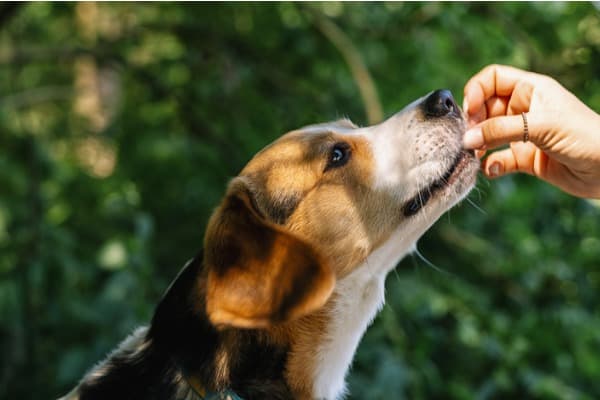
Distracting your dog and rewarding them for not eating poop goes hand-in-hand with the “leave it” command and can also work until the command is mastered.
The trick is to keep treats close by – treats that are even better than poo.
When you catch your dog being tempted by poop, distract them with a treat.
Give them a treat only if they manage to leave the poop without taking any.
Otherwise, they might associate treating with eating poop.
Get Rid of Poop Temptations
You don’t have to rely solely on removing temptations to get your dog to stop eating poop, but it can help train them out of the habit when there aren’t as many opportunities for them to do it.
Clean up your yard of dog waste, either by giving it a regular pass with a pooper scooper or picking up poo as soon as your dog leaves it.
You can also try dissolving the dog poop in your yard as a way to manage this.
Is there a dog poop eating deterrent that doesn’t require picking up poop?
Spraying the waste with lemon juice can deter a dog from eating it.
The strong citrus aroma and taste are, oddly enough, more disgusting to most dogs than the poop itself.
Tip: don’t do this for the poop in the litter box.
Lemon juice can be offensive to cats as well, and they might seek somewhere else to use the toilet if the box is uninviting.
Adding a digestive enzyme supplement to your dog’s diet can make their own waste too unappealing to even them.
This is something you should discuss with your veterinarian first, as there can be some side-effects if your dog has other conditions.
It’s important to note if your dog is actually getting sick and you note that their vomit smells like poop look into things further. There may be more at play in your dog’s situation.
Make Sure They’re Not Deficient in Any Essential Nutrients
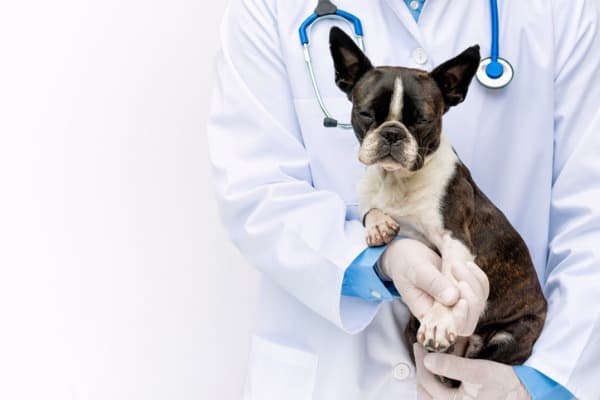
It can help to take your dog to a vet and rule out any deficiencies or shortcomings in their diet.
They might also have an undiagnosed condition that is preventing their small intestines from absorbing nutrients from their food.
This can be fixed easily:
If their coprophagia is due to something being off in their diet, they will often stop once that has been fixed.
Similarly, treatments available for dogs with malabsorption conditions will stop their urge to eat their own poop.
Some dogs will still be in the habit of eating their own waste even after they’re getting adequate nutrition.
Be patient with them and try the preventive measures we listed above.
Why it’s Important to Train Your Dog to Not Eat Poop
Curbing this behavior for your own sanity is a reason high on the list, and a good one.
There are other benefits to training your dog not to eat poop besides the “yuck” aspect.
Reduce the Risk of Issues Caused by Eating Cat Litter
You see a litter box that needs to be cleaned; your dog sees a snack with kitty litter “sprinkles.”
Obviously, you know cat litter is not a food group.
Your dog, however, doesn’t know that the cat litter they can ingest with cat poop is far from healthy.
Cat litter can have chemicals and substances in it designed to help it clump, absorb liquids, and deodorize.
Even if you’re using a natural cat litter made of paper, wood, or other biodegradable materials, it doesn’t always make it safe for anyone to digest.
Cat litter can swell in the stomach and cause things like constipation and obstructions in your dog’s intestines.
Even though poop is the root of this issue, you’ll want to see your dog produce a healthy one if they’ve eaten cat litter recently.
If not, a vet should check them out for blockages caused by the kitty litter.
Stop the Spread of Parasites
If your dog eats the waste of a cat or any other animal with a parasite infestation, they could get worms themselves.
Ideally, you already give all of your pets a monthly preventive medication that protects them from parasites.
If not, your cat’s parasite infection can spread to your dog. The only sign may be diarrhea in your dog, while they continue to act normally.
What if you don’t have a cat?
Your dog’s liking for eating poop outdoors still presents a risk for parasites if your dog isn’t protected.
Protect the Household from Bacteria
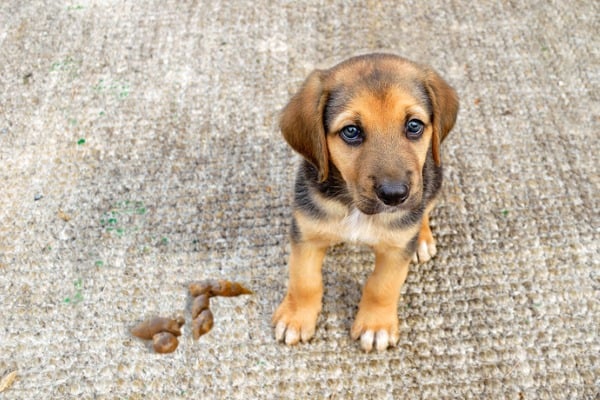
Dog and cat poop can contain dangerous bacteria like salmonella.
If your dog eats waste that is contaminated with this bacteria, they can become ill with salmonella poisoning.
There’s another risk in this scenario.
If they eat the poop and then lick you or a surface in the house, they increase the risk of spreading the infection to everyone they share a home with.
Be aware:
Dogs with salmonella infections will have symptoms such as fever, vomiting, diarrhea, lethargy, and lack of appetite.
Unfortunately, you could be in for the same if you fall ill with salmonella as well.
No More “ew” Factor
Let’s say the risks of your dog eating poop are significantly reduced: your dog is on preventive parasite medication, they haven’t swallowed any cat litter, and they’ve managed to avoid dangerous bacteria in whatever waste they ate.
Would you be okay with them cuddling you as normal?
Probably not.
If nothing else, putting a stop to a poop-eating habit can protect the bond you have with your dog.
You won’t need to keep them at arm’s length because of horrible breath or for licking you right after they’ve helped themselves to an unacceptable appetizer.
Coprophagia is sadly a reason some pet owners leave their dogs in shelters or worse.
Responsible, loving pet parents don’t give up on their beloved pets so easily, but we can understand the frustration you feel if this is an ongoing problem.
In extreme cases, home remedies might fail to produce results. Don’t give up on your dog just yet.
Some scenarios require calling in dog trainers or consulting with your dog’s vet for alternative solutions.
Coprophagia is a condition that can be solved with a combination of prevention and behavior modification – but don’t feel bad for turning to the pros if you feel overwhelmed.
Dogs Eating Poo: Nothing New
You aren’t the first pet parent dealing with the problem of dogs eating poop, and you certainly won’t be the last.
The good news?
It’s often an easy fix to dial down this behavior.
Answering the question – why do dogs eat poop – is the first step in finding a solution.
Once you have a better idea of why your dog is eating poop, you can move on to training them out of it.
It is now safe to resume your meal – if you still have an appetite.
